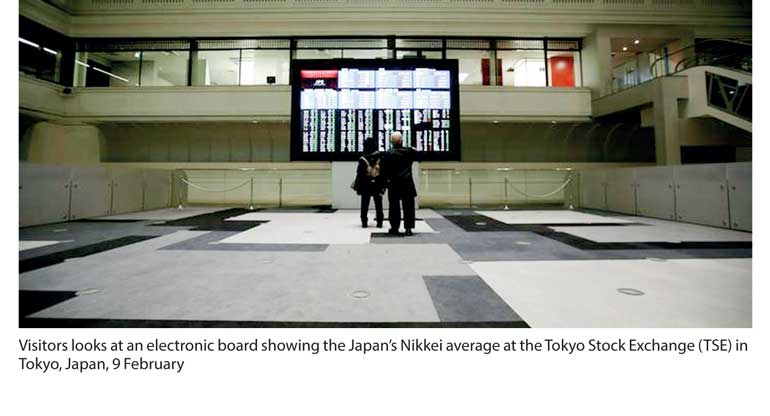Thursday Feb 26, 2026
Thursday Feb 26, 2026
Friday, 23 June 2017 00:00 - - {{hitsCtrl.values.hits}}
 Singapore (Reuters): Asian stocks advanced on Thursday, but oil futures hovered near a 10-month low hit overnight on concerns over a supply glut and falling demand.
Singapore (Reuters): Asian stocks advanced on Thursday, but oil futures hovered near a 10-month low hit overnight on concerns over a supply glut and falling demand.
European stocks were mixed with financial spreadbetter CMC Markets expecting Britain’s FTSE 100 to open up 0.1%, Germany’s DAX to be little changed and France’s CAC 40 to start the day down 0.1%. All three closed in negative territory on Wednesday.
MSCI’s broadest index of Asia-Pacific shares outside Japan climbed 0.7%.
Japan’s Nikkei .N225 rose almost 0.1 percent. Shares in auto air bag-maker Takata Corp plunged 50% as they exchanged hands for the first time since sources said last week it was preparing to file for bankruptcy.
South Korea’s KOSPI added 0.3%, while Australian shares jumped 1%. Taiwan shares hit a 27-year high.
Chinese shares added to gains made on Wednesday after MSCI included mainland shares in its emerging market indexes. The blue-chip index rose 1.3%. Hong Kong’s Hang Seng .HSI climbed 0.5%.
Crude oil was subdued as investors’ doubts that OPEC-led output cuts would dent a three-year glut offset data showing a drop in US inventories.
“The time for contrarian trades in oil is fast approaching, but I would want to see some stability in price and the technicals start to become more convincing,” said Chris Weston, chief market strategist at IG in Melbourne.
U.S. crude futures slipped almost 0.1%, or 3 cents, to $42.50 a barrel. They closed down 1.6% on Wednesday after touching their lowest level since August.
Global benchmark Brent lost 0.1%, or 5 cents, to $44.77. It closed down 2.6% on Wednesday after touching a seven-month low.
The resulting decline in oil shares hit Wall Street overnight.
The Dow Jones Industrial Average closed down 0.3%, while the S&P 500 was slightly lower. Nasdaq bucked the trend to end up 0.7%, lifted by biotech stocks.
Financial stocks also contributed to losses on Wall Street, driven lower by a drop in the Treasury yield curve to its flattest in almost a decade, as investors tried to reconcile a hawkish Federal Reserve with deteriorating inflation measures.
Boston Fed President Eric Rosengren and Fed Vice Chair Stanley Fischer suggested they are concerned less about raising rates too fast or too high than about keeping them too low for too long.
The yield curve between five-year notes and 30-year bonds flattened to 95 basis points, the narrowest since December 2007, on Thursday.
The dollar eased, falling 0.2% to 111.145 yen.
The dollar index was about 0.1% lower at 97.487, extending Wednesday’s 0.2% loss.
The New Zealand dollar gained 0.5% to $0.7257 after the central bank left its interest rate unchanged at a record low as expected and reiterated it would remain steady for a while.
Sterling was steady at $1.2674, holding Wednesday’s 0.3% gain on comments by the Bank of England’s chief economist that he was likely to vote for an interest rate hike this year. Until now, he has been seen as largely supportive of keeping rates low.
The euro was flat at $1.117, after Wednesday’s 0.3% gain.
The weaker dollar lifted spot gold 0.5% to $1,252.80 an ounce.